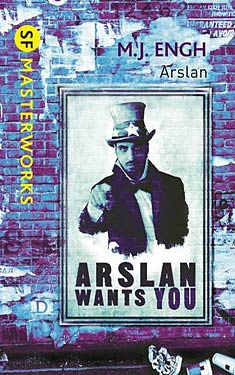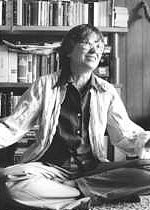WoGF Review: Arslan by M. J. Engh
 Guest Blogger and WWEnd member, Rob Weber (valashain), reviews science fiction and fantasy books on his blog Val’s Random Comments which we featured in a previous post: Five SF/F Book Blogs Worth Reading. Be sure to visit his site and let him know you found him here.
Guest Blogger and WWEnd member, Rob Weber (valashain), reviews science fiction and fantasy books on his blog Val’s Random Comments which we featured in a previous post: Five SF/F Book Blogs Worth Reading. Be sure to visit his site and let him know you found him here.
 For my tenth read in the Women of Genre Fiction Reading Challenge I picked Arslan by M. J. Engh. I’ve read a couple of more recent works in the past few months so I thought I’d pick an older one this time around. Arslan is Engh’s first novel and was published in 1976. To date, only four novels by Engh have appeared but with that small oeuvre she did manage to make quite an impression. She was named author emerita by the SFWA in 2009. Engh is also a scholar of Roman history. Something that clearly influenced this novel. The edition I’ve read is the Gollancz SF Masterworks edition. I guess the editors of that series have a knack for picking controversial books. Personally, I’m not sure I would have included it.
For my tenth read in the Women of Genre Fiction Reading Challenge I picked Arslan by M. J. Engh. I’ve read a couple of more recent works in the past few months so I thought I’d pick an older one this time around. Arslan is Engh’s first novel and was published in 1976. To date, only four novels by Engh have appeared but with that small oeuvre she did manage to make quite an impression. She was named author emerita by the SFWA in 2009. Engh is also a scholar of Roman history. Something that clearly influenced this novel. The edition I’ve read is the Gollancz SF Masterworks edition. I guess the editors of that series have a knack for picking controversial books. Personally, I’m not sure I would have included it.
Some time during the later stages of the cold war, a figure from the small nation of Turkestan rises to prominence in the world. Caught between China on one side and the USSR on the other, he cleverly uses a combination of politics and extortion to gain control of the armies of the major powers in the world. What he means to do with it remains unclear but the inhabitants of the small town of Kraftsville, Illinois get a shot at finding out when the new dictator of the world settles there for a time. His motives are unclear but he brings great change to the town. Whatever Arslan is up to, he has changed the world for good.
The main problem I have with this novel is that it is horribly implausible. Engh is not too specific on how Arslan gains power, by the time we meet him in the opening stages of the novel, he is already firmly in control. Since his nation has less inhabitants than most of the major cities on the planet, force of arms is clearly not an option. Force of personality obviously has something to do with, and cleverly manipulation people, but world politics is full of people who can do just that. And know how to defend themselves.
 In the opening stages of the book, Arslan is portrayed as a brutal dictator. He rapes a young boy and a young girl in front of his men shortly after arriving, in what is certainly the most shocking scene in the book. Arslan appears to think himself a Caesar. Divine, entitled to shape the world in whatever way pleases him because he has the power to do so. He feels that the rules he imposes on others do not apply to him. In more modern terms we’d call it megalomania. Arslan believes he is so invincible that he even offers one of the main characters the chance to shoot him. As it turns out it is not the first, nor the last, time that he exposes himself to such a risk. Unbelievably, nobody takes him up on the offer and the world is left to pay the price for this stunning bit of cowardice.
In the opening stages of the book, Arslan is portrayed as a brutal dictator. He rapes a young boy and a young girl in front of his men shortly after arriving, in what is certainly the most shocking scene in the book. Arslan appears to think himself a Caesar. Divine, entitled to shape the world in whatever way pleases him because he has the power to do so. He feels that the rules he imposes on others do not apply to him. In more modern terms we’d call it megalomania. Arslan believes he is so invincible that he even offers one of the main characters the chance to shoot him. As it turns out it is not the first, nor the last, time that he exposes himself to such a risk. Unbelievably, nobody takes him up on the offer and the world is left to pay the price for this stunning bit of cowardice.
Arslan enforces a way of life that even in small town America, with it’s ideal of a simple country life, is a serious step back. The economy is reverted to local produce only, contact with the outside world is reduced to a minimum and any technology that can’t be sustained by local means phased out. Arslan appears to want to create a sort primitive agrarian state, which is quite scary if you consider what was going on in Cambodia at the time this book was published. You don’t really want to think about the effect such policies would have on highly urbanized areas. It is back to basics for Kraftsville but that is not all he has in mind. After a while it becomes apparent no children are born anymore and then his true motivations come to the surface.
At this point it becomes clear what Engh is trying to achieve with the novel. Arslan is further developed into a round character. No longer the archetype of a tyrant, he is described as tirelessly working towards his goals, prepared to make large personal sacrifices of his own and living by his own moral standard, albeit a different one from what would be acceptable in small town America. Engh is trying to make the reader feel sympathy for Arslan and puts in a lot of effort to achieve this.
All of this is seen through the eyes of two main chanters. The first is Franklin L. Bond, principal of the town’s school and a respected figure in Kraftsville society. He feels it is his duty to keep the place together and to that end collaborates extensively with Arslan. He is also in control of a pitiful excuse for resistance that arises in Kraftsville. Ironically, most of their work seems to consist of restraining people from doing something suicidally stupid. His ambivalence towards Arslan prevents him from doing anything meaningful beyond running the town. Given Arlan’s plans, that is simply not enough.
The second point of view is that of Hunt Morgan, the boy who is unfortunate enough to be raped by Arslan. Later on, Hunt develops a complex relationship with his rapist, of appearing jealous when he lavishes his attention on others. Engh uses Hunt to show the reader that in his own way Arslan does care, thereby creating another shade of grey. It’s another part of the story I had trouble believing. The voice of Hunt is also much more difficult to read. He uses just about every adjective in the dictionary at least once in his point of view sections. I didn’t think it was quite convincing for a boy his age. Although it must be said he is very well read.
I guess whether or not you will like this novel depends on how well you think the author succeeds in making a very unlikely plot sound plausible. For me this pretty much failed on all fronts. I appreciate the efforts of the author to make the reader go back and froth between seeing Arslan as Lucifer himself and a caring man for those around him but in the end his character feels forced. Too extreme in many areas to be believable. The same goes for Hunt really. Franklin is more realistic. People keeping their heads low and muddling through would be very common in such a situation. He can’t carry the story though, and so Arslan turned into a skillfully written but ultimately unsatisfying read for me.



















 Full Details
Full Details


No comments yet.
Sorry, the comment form is closed at this time.